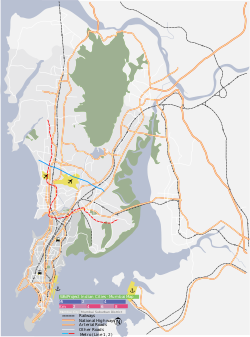| Gate of Mercy Synagogue | |
|---|---|
 The synagogue in 2008 | |
| Religion | |
| Affiliation | Orthodox Judaism |
| Rite | Nusach Sefard |
| Ecclesiastical or organizational status | Synagogue |
| Year consecrated | 1796 |
| Status | Active |
| Location | |
| Location | 254 Samuel Street, South Mumbai, Konkan, Maharashtra |
| Country | India |
Location of the synagogue in Mumbai | |
| Geographic coordinates | 18°57′08″N 72°50′11″E / 18.95226°N 72.836373°E |
| Architecture | |
| Funded by | Samaji Hasaji Divekar |
| Date established | c. 1750s (as a congregation) |
| Completed | |
| Specifications | |
| Capacity | 300 worshipers |
| Interior area | 8 by 16 m (26 by 52 ft) |
The Gate of Mercy Synagogue (Hebrew: שער הרחמים; Malayalam: दयेचे द्वार[1] or Malayalam: जुनी मशिद), also known, since its centenary in 1896, as the Shaar Harahamim Synagogue,[2] and known colloquially as Juni Masjid, is an Orthodox Jewish congregation and synagogue, located at 254 Samuel Street, in South Mumbai, in the division of Konkan, in the state of Maharashtra, India.
Built in 1796,[3] it is the oldest synagogue in Mumbai.[4] The synagogue was built by Samaji Hasaji Divekar (also known as Samuel Ezekiel), a Bene Israeli, near CSMT in South Mumbai. The synagogue was later rebuilt and moved to the present location at Mandvi in 1860.[5] In the eighteenth and nineteenth centuries, the area was inhabited by a small but thriving Jewish community.[6]
- ^ "Hidden history". DNA India. 12 September 2014. Retrieved 24 January 2019.
- ^ "Maharashtra - Shaar Harahamim Synagogue". Indian Jewish Heritage Center. 2014. Retrieved 13 November 2024.
- ^ "Indian Synagogues". Jewish India. Retrieved 11 August 2008.
- ^ Masih, Archana (11 September 2003). "For these Jews, Mumbai is the chosen land". The Rediff Special. Rediff.com. Retrieved 11 August 2008.
- ^ "Mumbai B Ward Plan". Department of Relief and Rehabilitation, Government of Maharashtra. Archived from the original on 8 September 2008. Retrieved 11 August 2008.
- ^ Cite error: The named reference
israel-goldsteinwas invoked but never defined (see the help page).

